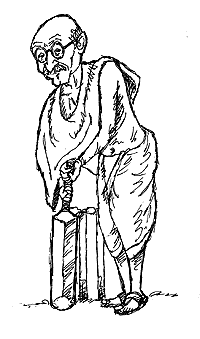 What is it about the sport of cricket that inspires such self-deception among its fans? The recent cover story in Himal South Asia magazine about cricket, caste and the Bollywood movie Lagaan has become a hot topic of conversation and letter writing, with opinions starkly divided. Not just divided, but at near violent loggerheads. And a good thing that excellent magazine is read only by a well-informed minority of opinion makers in the region. Even cricket can be fodder for the "divide and rule mob", some of whom are still rampaging in Gujarat. Let me state first of all that I am no fan of the game of cricket, that I find it tedious, tendentious and anachronistic.
What is it about the sport of cricket that inspires such self-deception among its fans? The recent cover story in Himal South Asia magazine about cricket, caste and the Bollywood movie Lagaan has become a hot topic of conversation and letter writing, with opinions starkly divided. Not just divided, but at near violent loggerheads. And a good thing that excellent magazine is read only by a well-informed minority of opinion makers in the region. Even cricket can be fodder for the "divide and rule mob", some of whom are still rampaging in Gujarat. Let me state first of all that I am no fan of the game of cricket, that I find it tedious, tendentious and anachronistic. My last foray into these troubled waters was during the Hansie Cronje affair in Delhi. My first was several years earlier in Pakistan, during a controversy about certain members of the Pakistan cricket team caught drunk and with illegal substances on a beach in Barbados. On both occasions, and many times in between, I fell afoul of the British sporting media by laughing at the stories in question and adopting the attitude "well, they would, wouldn't they." Now we reporters tend to regard most things with cynicism, a sense that nothing is as it seems and the public face being put on events is not to be trusted. For an explanation of most things, look to human nature, greed, lust, an overestimate of one's own competence.
That's certainly how I interpreted the tale of poor Cronje, South Africa's cricket captain, caught by the Delhi police with a pocket full of bookmakers' money. He was, it seems, offering advice on pitch conditions and such-at ten thousand dollars a pop. Not bad for a weather report. To me, he was obeying one of my natural laws, giving way to greed, salting away filthy lucre for that not too distant day when his cricketing skills no longer earned him big bucks. Wrong, perhaps, but in the pantheon of human sins, venal, not virulent, not harming anyone save perhaps the poor suckers who bet with uninformed bookies.
But the British (and South Asian) sporting press saw things differently. Words like "tragedy', "outrage" and "criminal" popped up regularly. The phrases were even more overwrought. "A stain on the face of the sport," according to one BBC commentator, "a body blow to cricket," said a writer on the game. Excuse me? What are we talking about here? An international enterprise that earns vast sums of money for a panoply of people, not least bookmakers, or a pristine, pure pastime of gentlemen on a village green in Victorian England. Respectfully, I say the former. Sport is big business, among the biggest. Content, entertainment, closely linked with the marketing of lucrative and luxurious consumer items, and its players deserve to get what chunk of action that they can. If, like Hansie Cronje and all sorts of others, they cross a legal line and are caught, they must be punished. But they must not be vilified by Talebanesque supporters and media types, people who've deceived themselves into thinking professional cricket is a religion and not a big business masquerading as a sport.
So too with the Himal analysis of cricket's casteism, its uniquely South Asian twisting of British imperial elitism in the selection process, its subtle symbolism in support of the status quo, its ability to seem more than the venal enterprise I'm talking about here. The article was a good read. It made certain points, and we should all favour deconstruction of anything we hold dear, if only to strengthen it, make it more sustainable. But no, keep your hands off cricket, it's doing rather nicely without grubby journalists prying around and getting ink stains all over bat, ball and those nifty pullovers worn on even the hottest days.
I'm no great fan of any other sport, although I have a soft spot for football-dead simple, a great leveller, a platform for the poor to shine in many countries. But also a pursuit that drips money from its seams, that tempts wrongdoing and match fixing and the misuse of fame by simple souls exploited by the bookies, agents and other profiteers. So too America's sports of baseball, basketball etc. But Americans-at least-see their sporting heroes as professional athletes, not angels or guardians of tradition.
Cricket needs to loosen up, to drop the holier than thou attitude, to accept that it's part of the entertainment business, and not a metaphor for life. Control match fixing if you can, but don't put Hansie Cronje or anyone else who defies your perceptions of the game in a pit with Jack the Ripper. Besides, a sport that excepts the role of legal money, marketing and profit-maximisation might just be more egalitarian and even successful. As we saw in Lagaan, no caste, class or ethnic group has the market cornered on hitting sixes, fast bowling or sharp fielding. Howzzat?



